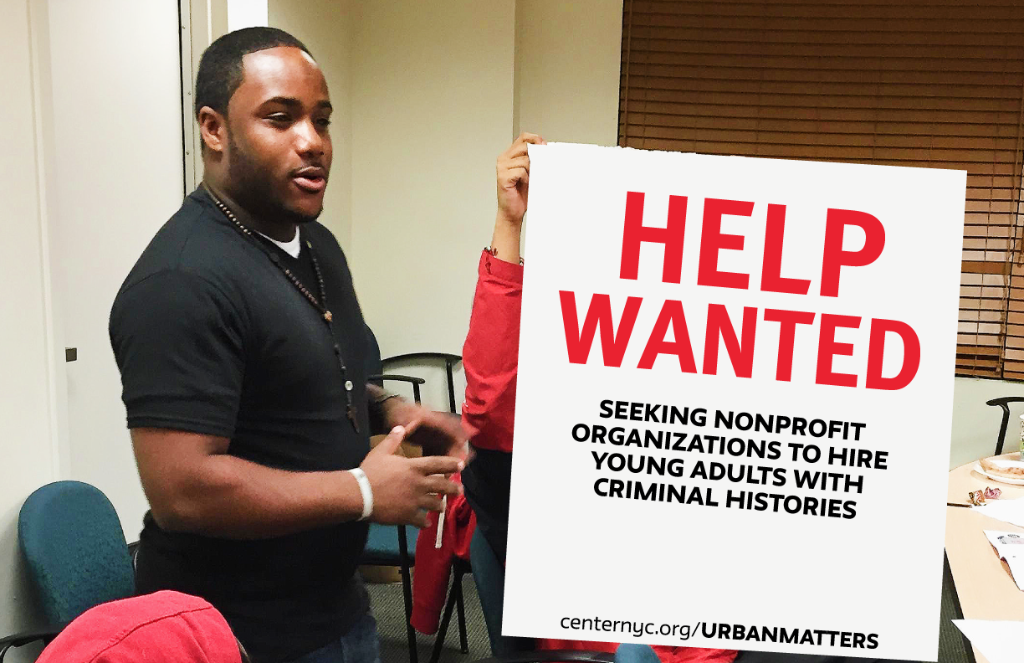March 9, 2016
Help Wanted: Nonprofits Hiring Young Adults with Criminal Histories in Supportive Work Environments
By Julie Peterson
Many social service programs aim to get young people ready for work. Not enough hire them.
As important as education and training are, they often fall by the wayside for young people living in poverty, lost in the unending immediate need for funds to survive and support a family. Without a job to provide those funds, inevitably, many young people turn to a shadow economy – and that often leads to a criminal record. Once that spiral has begun, opportunities for legitimate employment become few and far between. Opportunities for meaningful employment are almost nil.
Social service programs can play a critical role helping to break that cycle. I applaud organizations that walk the walk. Community Connections for Youth and Good Shepherd Services hire young people with criminal records as youth workers to mentor and support other youth. Concrete Safaris recently received a Pinkerton Foundation grant to hire young adults served at neighborhood youth justice programs to work in its afterschool outdoor activity program in East Harlem. As evidence grows for the efficacy of credible messengers – people from the same communities who have had contact with the criminal justice system that serve as mentors for at risk youth – providers are not just offering a second chance but hiring the best people for the job.
Credible messengers are particularly talented at reaching young people. They have a strong desire to give back. They care for real and the young people know it. They are willing to go the extra mile. Mentors receive training in leadership, facilitation, restorative justice and cognitive behavioral systems that help young people change attitudes and behaviors that hold them back.
Organizations that serve young people can lead the way in employing credible messengers and should be supported to do so. We need to clear the barriers and enable young adults to thrive. None of this works if people can’t get jobs and make money legitimately. When we offer people meaningful work – as youth workers, mentors, and paraprofessionals – they not only help youth but are served themselves, personally and professionally. The work cements, validates, and inspires their own development and transformation. Everybody wins. Our children are stronger. Our neighborhoods are safer.
We know that stable employment is a strong predictor of successful re-entry. New York and more than 100 other cities and counties have signed “ban the box” laws recognizing the discrimination faced by people with histories of incarceration. The stigma of incarceration weighs especially heavily on black men. Devah Pager’s often cited study showed the likelihood of a call back for a job interview fell by two-thirds for a black man with a criminal record compared to a black man without a record; a white man with a criminal record was more likely to be called back than either group of black men. And we know that young people who don’t establish early work experience are economically scarred for decades.
In many low-income communities, nonprofits are the largest employers. These organizations can create supportive work conditions with supervisors who are willing to take on mentorship and coaching roles and help new workers learn the organizational culture and expectations. It is time for nonprofit organizations to hire and support young people with criminal histories. Train them in cognitive behavioral therapies, restorative practices and healing-informed care, and provide a strong boost to their personal and professional development. And it’s time for foundations and government agencies to lead the way.
Julie Peterson is a senior program officer at the Pinkerton Foundation. Her portfolio includes programs for young people in New York City who are involved in the justice and foster care systems. Peterson has decades of experience working on youth and family justice issues. She has served in philanthropy, local government, and in the nonprofit sector.
Photo Credit: Community Connections for Youth


